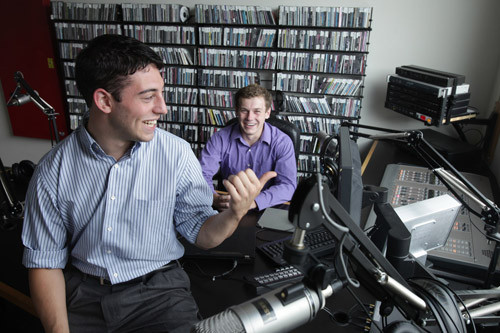
Tom Eakin, vice president of student affairs at Bryant University, can recall about 10 years ago when the student-run radio station, WJMF at 88.7FM, was in a sorry state, with only about 10 students involved and a listenership almost as small.
A campus radio station “can be a bit of a money pit if you don’t have the right students running it,” he said.
Tyler Pepe, a Bryant senior intending to pursue a career in professional radio, spoke of “disarray” at the station years ago when he said it was run “out of a closet” at 10 watts that barely carried the signal across campus. The station was started almost 40 years ago, in 1972.
Today, WJMF is a professional operation available on the Internet with 24/7 programming, including live coverage of campus events, and about 100 students taking part in operations, from dealing with business matters to deciding content and producing their own shows.
“I have to give great credit to the students” for the WJMF turnaround, Eakin said, because it was a series of former students within the last decade who took on the challenge of creating and implementing a business plan to improve the station. “They did a great job of taking the radio station and building it into something special,” he said.
And now the Bryant radio station is poised to become even more special.
The university is partnering with Boston public broadcaster WGBH to bring the latest technological advances in radio to the Smithfield campus and, at the same time, return classical music radio to Rhode Island.
The university and the public broadcaster announced in early June that WGBH’s 99.5FM all-classical station will be retransmitted to the Providence area on 88.7FM, starting in August. The signal of the Bryant station will be boosted from 225 to 1,200 watts, so it covers northern Rhode Island, the Newport area and nearby Massachusetts as far north as Milford, Mass., according to Eakin.
Student-run WJMF will remain as it is on the Internet, but its spot on the FM radio dial will be taken by the new WGBH all-classical station and WJFM will become accessible only to those with HD radios, HD radio receivers or adapters. Plans are in the works to provide each class of incoming freshmen and other campus personnel with free HD receivers, university representatives said. By 2015, experts say, HD radio will dominate the airwaves.
“Bryant has just taken a strategic step in a new direction with a terrific partner,” said Ronald K. Machtley, university president and former Rhode Island congressman, in a prepared release.
“The arrangement involves no capital commitment on behalf of WGBH,” according to the same news release from the university, which also notes that Bryant recently was awarded a construction permit from the Federal Communications Commission to boost its signal. Asked about the cost to Bryant, officials at the private university declined to provide details.
Joe O’Connor, general manager at WRNI, the Providence-based, public radio station serving most of Rhode Island, revealed that his station at Bryant’s request submitted a bid for the contract, but lost out to WGBH, whom he described as its “most direct competitor.” “It’s tough for the hometown team to compete with a huge, public media conglomerate in Boston,” he told Providence Business News.
O’Connor said he had hoped to work out an arrangement that would bring the Rhode Island Philharmonic Orchestra to local radio.
Ricky McLaughlin, a Bryant senior majoring in accounting from Hudson, N.H., and general manager of WJMF, said he’s excited about the partnership because it will enable the student-run station “to do things no other college stations have the ability to do,” such as broadcast in HD.
Jeanne Hopkins, vice president for communications at WGBH, said the Bryant partnership is a “perfect fit” because the Boston-based, broadcasting company is “really an educational media.” She declined to discuss details of the arrangement, including financing, except to say that some specifics have yet to be worked out. “We’re so excited about this that we were eager to tell the world it’s coming, but we still have things we have to work through,” she told PBN.
Pepe said losing the 88.7 slot on the FM radio dial is “a little bit of a drawback, ” but one balanced by “the big win” of having WGBH help prepare mobile applications for smartphones and other devices. “Our push,” he said, will be to increase WJMF’s ability to reach listeners on platforms other than what he called “traditional terrestrial radio.”
Pepe, from Orange, Conn., described the partnership as teaming WJMF up with a “varsity player in the game” and a “unique experience. I’m not sure how many other colleges put this much power in the hands of students,” he said. •













This is simply yet another large corporation buying up an educational frequency. How is this even legal? The purpose of these broadcast licences were for students to learn how to broadcast on the radio. Bryant just sold 88.7 to the highest bidder. The “partnership” is merely replacement radio equipment it seems, which is silly since the station received all new equipment in the mid 2000s. No one has an HD radio and smartphone streaming is becoming a thing of the past with data limits on most plans. Bryant is NOT putting students first here.